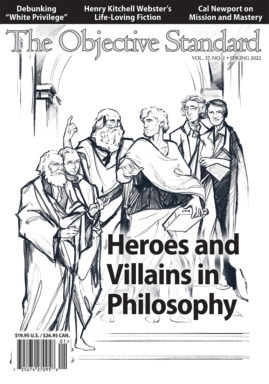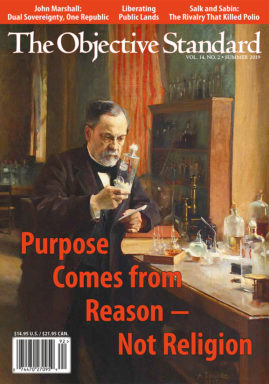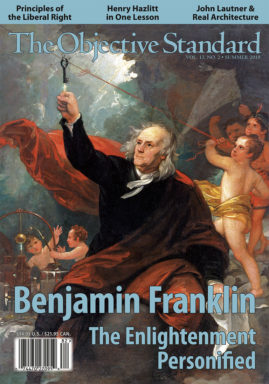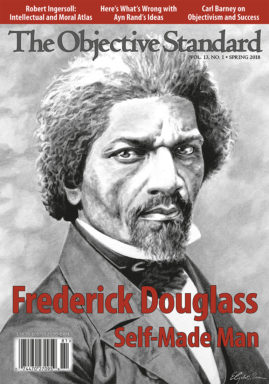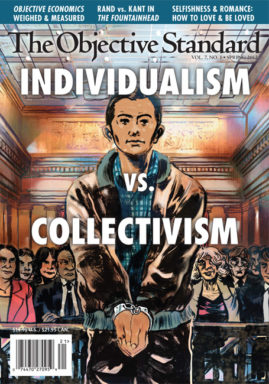Summer 2017 • Vol. 12, No. 2

Cover Article
Ayn Rand & Objectivism, Philosophy
Egoism, Benevolence, and Generosity
Although benevolence and generosity are not universally life-serving and thus are not moral virtues per se, they can be, and often are, profoundly selfish.
Features
History
Captain Cook: Explorer of the Enlightenment
This is the story of Captain James Cook, the greatest navigator and explorer of his age—and perhaps of all time.
Philosophy
Secular, Objective Morality: Look and See
Objective morality comes not from revelation, faith, or divine commandments—but from observation, logic, and the laws of nature.
Philosophy
Religion Is Super Subjectivism
Shows why religion—or “supernatural” subjectivism—is significantly more subjective than secular subjectivism.
Politics & Rights
The Vital Function of the Left-Right Political Spectrum
The idea that the entire left-right political spectrum is statist is not merely wrong; it is disastrously wrong.
Politics & Rights, Science & Technology
Don’t Blame Republicans for Failure to Repeal Obamacare
Republicans will not repeal Obamacare—but don't blame them; blame the moral code of altruism, in which the culture is steeped.
Philosophy, Politics & Rights
Enslaved by Altruism
Widespread outrage concerning the Ryan plan shows the extent to which Americans regard people’s needs as constituting rights.
Arts & Culture
Seven Great Poems on Independence
Poems on the theme of independence, by William Ernest Henley, Henry Lawson, Edgar Guest, Badger Clark, Ralph Chaplin, Dale Wimbrow, and Robert Burns.
Shorts
Philosophy, Politics & Rights
The Shapiro Principle: A Godsend for Lovers of Liberty
The Shapiro Principle is the means to a mass movement that grounds rights, freedom, and capitalism in reason, observation, and logic.
Philosophy
A Step Toward Rational Secularism Is Better than None
Addresses criticisms of “The Shapiro Principle” with questions about how best to encourage religious people to embrace reason and freedom.
Ayn Rand & Objectivism, Philosophy
Ben Shapiro Denies and Affirms the Law of Identity
Ben Shapiro claims that all philosophic foundations are subjective, but, in action, he reaffirms the objectivity of some.
Philosophy, Science & Technology
Reason and Capitalism, or Unreason and Environmentalism: Choose Wisely
If liberating a bulldozer’s dharma nature and returning it to the Earth strikes you as crazy, you’re not using your reptilian cortex.
Politics & Rights
The Poor, Disabled, and Helpless Under Capitalism
Shows that under laissez-faire capitalism, the poor, disabled, and helpless would fare as well as is possible.
Philosophy
Dennis Prager’s Faith Meets Jihad in the Name of “God”
As Dennis Prager again insists that if there is no God, anything goes, another jihadist commits mass murder in the name of God. The irony...
Philosophy
A Challenge to Dennis Prager about Secular Morality
Craig Biddle offers Dennis Prager $10,000 to debate whether secular objective morality exists—or whether objective morality depends on God.
Ayn Rand & Objectivism, Philosophy
Why the Prager-Shermer Debate Will Go Essentially Nowhere
Dennis Prager and Michael Shermer’s discussion about secular, objective morality is unlikely to make significant headway. Here’s why.
Philosophy, Politics & Rights
The Muddy Waters of the Nolan Chart
In its aim to make room for “nuance,” the Nolan chart muddies political waters in myriad ways.
Good Living, Science & Technology
My Non-Sacrificial Donation of Stem Cells to Save a Life
College student Mark Coldren recounts his experience and reasons for donating stem cells to save the life of a man halfway around the globe.
Ayn Rand & Objectivism
Adam Smith Institute’s Eamonn Butler Extols Ayn Rand
Three cheers to Dr. Butler and the Adam Smith Institute for writing and publishing an important article on Ayn Rand and her ideas.











